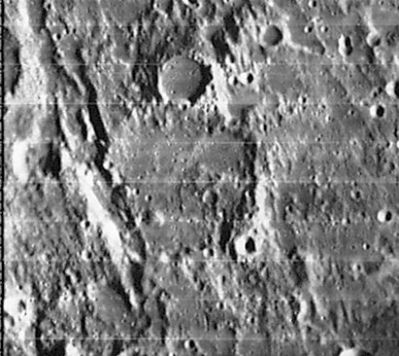Gyldén
Contents
Gyldén
|
Lat: 5.3°S, Long: 0.3°E, Diam: 47 km, Depth: 1.13 km, Rükl: 44 |
Images
LPOD Photo Gallery Lunar Orbiter Images Apollo Images
- The 2nd concentric crater in C. A. Wood's list of 1978 is located slightly northeast of Gyldén and east of Réaumur A. This concentric crater is noticeable on the Hi-Res scan of Lunar Orbiter 4 photograph 101-H3.
- Gyldén and the concentric crater nearby were also captured on Apollo 12's orbital Hasselblad photograph AS12-50-7431 and its "twin brother" AS12-50-7432.
- Although there's nothing in the LPI's search-list for orbital Apollo photographs of Gyldén (erroneously there are 5 Apollo frames for "Glyden"), this crater was photographed by the north looking mapping/metric Fairchild camera of Apollo 16. Frame AS16-M-1407 (of REV 37) shows the difficult-to-recognize crater Gyldén near the frame's centre.
- About the same view as in AS16-M-1407 is AS16-M-0843 (of REV 27), which shows Gyldén in the light of the local morning sun.
- Research L.O.-4, Apollo 12, and Apollo 16 photography: Danny Caes
Maps
(LAC zone 77B4) LAC map Geologic map LM map AIC map LTO map
Description
Description: Wikipedia
Additional Information
Depth data from Kurt Fisher database
- Westfall, 2000: 1.13 km
Nomenclature
- Named for Johan August Hugo Gyldén (May 29, 1841 – November 9, 1896), a Finnish-born Swedish astronomer most noted for his original researches in the theory of planetary motions, much of which he left unpublished. In 1871 he was called by the Royal Swedish Academy of Sciences to be its astronomer and head of the Stockholm Observatory.
- This feature was Catalog number 2952 in Mary Blagg's Collated List, where the name Herschel h is noted in Neison, 1876. None of the other authorities named this feature.
- The Gylden (without the accent) was introduced in the original IAU nomenclature of Named Lunar Formations, reportedly following a proposal by Krieger
- The valley-shaped depression at Gyldén's western rim (which is part of the Imbrium sculpture) is unofficially called Vallis Gyldén by D.Caes.
- For some unexplainable reason, this name (GYLDEN) is still printed as "GLYDEN" on LAC 77 (page 155) in the REVISED AND UPDATED EDITION of the Clementine Atlas of the Moon (2012, CAMBRIDGE UNIVERSITY PRESS).- DannyCaes Jan 6, 2013
LPOD Articles
Lunar 100
L92: Part of the Imbrium radial sculpture.
Bibliography
- Hugo Gyldén (obituary notice)
